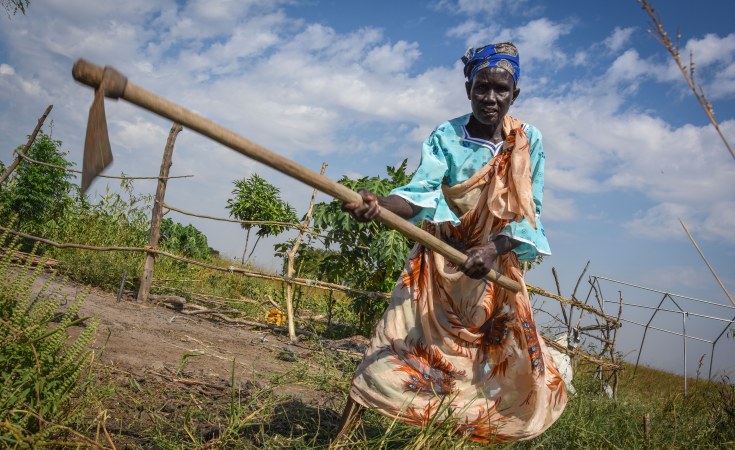
New IFAD case study in Mali shows diaspora finance and investment play an essential role in helping vulnerable populations adapt to climate change As climate experts gather in Riyadh, Saudi Arabia, for the last global climate summit of 2024, the UN's International Fund for Agricultural Development (IFAD) today launched two new reports shedding light on the transformative role of remittances, the money sent home by migrant workers. "These funds are not just about sending money back home," said Pedro de Vasconcelos, Manager, Financial Facility for Remittances at IFAD, speaking of the reports undertaken by IFAD in collaboration with the UN Convention to Combat Desertification (UNCCD). "Migrant families are using remittances to improve food security, diversify incomes, and adopt sustainable farming practices like drought-resistant crops and agroforestry.
" The two reports -- " Migrant Remittances and Diaspora Finance for Climate Resilience " and " Remittances for Climate Change Adaptation in Mali "— show that remittances are a vital financial flow that enables rural communities to cope with shocks like droughts, heatwaves, and floods. Remittances also give poor farming families the financial security to adopt longer-term strategies such as natural soil fertilization, pest control, and investment in climate-smart agricultural techniques. The IFAD study showed that households receiving remittances are investing more in climate-resilient activities and products than families not receiving them.

However, climate change adaptation requires additional resources and broader support, according to the reports. IFAD echoes the call made at Dubai's COP28 to address the estimated US$400 billion-a-year by 2030 needed by African nations to adapt to climate change, and urges leaders to make a concerted effort to further evaluate the impact of diaspora investments on climate resilience. "Data collection and impact assessments are essential in scaling up successful approaches, while ensuring that remittances and diaspora investments fully contribute to closing the adaptation finance gap in sub-Saharan Africa.
With innovative solutions and coordinated efforts, both remittances and diaspora investments can help safeguard the future of millions across the region. They hold immense potential to drive adaptation efforts in vulnerable communities across Sub-Saharan Africa," added de Vasconcelos. Mali case study Sub-Saharan African countries have been hit hard by the impacts of climate change, destroying livelihoods and driving high levels of migration.
The case study reflects findings from a survey of 400 households from the Kayes and Sikasso regions, where subsistence agriculture is predominant. "In this context, remittances are a lifeline for households facing climate shocks. At the same time, as migrants living abroad try to make life more bearable back home by sending money to support their families, a major capital flow is reaching regions particularly vulnerable to climate change," said de Vasconcelos.
The potential of remittances In 2023, the African diaspora sent US$90 billion in remittances, matching Official Development Assistance (ODA) and double the amount of Foreign Direct Investment, according to World Bank data. The IFAD report broadens our understanding of the potential of remittances to support climate adaptation and resilience. The reports include examples from regions in Africa and Latin America – including Burkina Faso, Mexico and Senegal -- providing evidence of how remittances boost local economies, advance sustainable farming, and contribute to better management of natural resources.
However, the potential impact of remittances is hindered by insufficient access to information about "green" investments and tailored financial products for the diaspora. IFAD advocates for strategic initiatives to address these challenges, including financial tools for larger diaspora investments and better access to information on climate-smart opportunities as to maximize the local benefits of remittances for vulnerable communities and scale up their contribution to climate adaptation. Close Sign up for free AllAfrica Newsletters Get the latest in African news delivered straight to your inbox Top Headlines Climate Africa International Organisations Submit By submitting above, you agree to our privacy policy .
Success! Almost finished...
We need to confirm your email address. To complete the process, please follow the instructions in the email we just sent you. Error! Error! There was a problem processing your submission.
Please try again later. _ready.push(function($) {if ( ! loadjs.
isDefined( 'newsletter-signup-assets' ) ) { loadjs( ["https://cdn01.allafrica.com/static/js/jquery/jquery.
serialize-object.min.js?v=2024120400","https://cdn05.
allafrica.com/static/js/newsletter-signup.min.
js?v=2024120400","https://cdn05.allafrica.com/static/css/newsletter-signup.
min.css?v=2024120400"], 'newsletter-signup-assets', { async: true, });} // the newsletter widget calls storageAllowed(), which is imported with // the cmp bundle. passing an array of bundle names to loadjs triggers // the callback only after all of the listed bundles have fired.
loadjs.ready( [ 'cmp', 'js-cookie', 'events', 'newsletter-signup-assets' ], function() { $('.newsletter-signup.
inread.collapse.w-background.
w-background-color.blue').newsletterInRead({ maxShowCount: 10, maxCloseCount: 3, maxSuccessCount: 1, }); }); }); In Mali, with co-funding from the EU, IFAD is connecting migrant workers in Europe with professional investors through a programme that supports small and medium-size agribusinesses (SMEs).
This support helps these SMEs develop their businesses and increases their impact in agri-food value chains with capital investment from the Malian diaspora in Europe. "It means a lot to us, it shows us that Malians abroad want to help their country, they're patriots, they haven't forgotten us. They can be reassured that we will use their funds as they wish and where they are needed," says Oumarou Amadou Sankaré, representative of SOPROTRILAD, a Malian company with 400 employees that produces, processes, and markets rice, supporting more than 3,000 small producers in partnership with over 160 agricultural cooperatives.
Ciwara Capital, a venture capital fund entirely owned by the Malian diaspora, has been investing in SOPROTRILAD. loadjs.ready( 'lazyload', function () { const images = document.
querySelectorAll('body.interior.story.
aans.view .story-body img.
lazy'); lazyload(images,{rootMargin:"200px 0px"}); }); ready(function () { fireLoadJSBundle('lazyload'); }); Read the original article on IFAD ..














